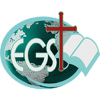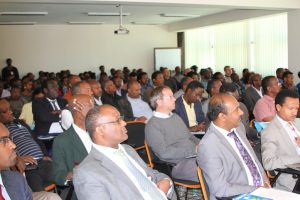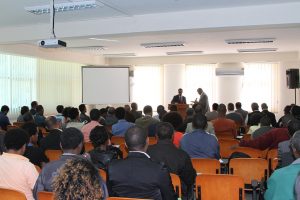A research dissemination workshop on “Redefining Development from Faith Perspective” was conducted on January 13, 2017 at the Ethiopian Graduate School of Theology, EGST. The findings of the research project under the overarching theme of “Theology-Development Nexus” incorporated Biblical and Theological Perspectives on Development and Perceptions of Faith Leaders on Development from Three Selected Evangelical Denominations. The study churches include the Ethiopian Evangelical Church Mekane Yesus (EECMY), Ethiopian Kale Heywet Church (EKHC) and Ethiopian Full Gospel Believers’ Church (EFGBC).
The findings of the research on Biblical and Theological Perspectives on Development were presented by Dr. Theodros Assefa, EGST Head of Academic Affairs, summarizing three papers of Drs Misgana Mathewos, Desta Heliso and himself. The other part presented by Mr Addise Amado, EGST Head of Development and Communications, was the findings organized byDr. Aklilu Dalelo, Fitsum Zelalem and two research assistants. The presentations were followed by a round of discussions, comments and recommendations. The objective of the workshop was to disseminate and share the findings before publishing the output.
In his welcome address to the workshop, Dr. Misgana Mathewos, EGST Director, highlighted that “the intersectionality of theology and development has long suffered by longstanding dichotomization between sacred and profane, or spiritual and secular which pin down the theology (faith) in sacred/spiritual and the development in secular sphere. These two have been considered as mismatching pair that exist and operate in their own differing worlds. Both sides may ask: what does one to do with another?”
Explaining the progress and challenges of the interdisciplinary process, the Director noted that “the interplay between theology and development has become familiar in many of the Western and in some African Institutions but there is a long way to go to introduce this in Ethiopian Christian and academic traditions. One of the major hurdles that exacerbate such dichotomy in Ethiopia is the policies of the successive governments that do not recognize religious/theological education on the basis of separation of state and religion in the past four decades and the churches’ unqualified reception of those policies.”
Emphasizing on EGST roles, he indicated that “EGST strives to serve the society by producing development practitioners through MA in Development Studies program and by conducting integrative research taken up by both theologians and non-theologians such as the one we present today, because EGST believes that theologically and ethically shaped development leaders could transform the society. The service to church and society will be extended further through its community engagement activities, the research on Environmental Stewardship and the introduction of Public Theology.”
In his closing remarks to the workshop, Dr. Lidetu Alemu, Leadership and Management Program Leader and lecturer in Organizational Leadership at EGST further summarized the link between Faith, Development and Leadership. “The issue of faith and development is a complex discussion due to the ideological tenets therein. And, those ideological perspectives need to be re-evaluated and reformulated… Future direction on the interplay among faith, development, and leadership can be re-directed towards the potential relationships among different factors in these disciplines” Dr. Lidetu observed.
He further noted that “as we go out from this workshop, let each of us find out how we can contribute to this discussion and the practice thereof. Let’s continue to rethink and redefine our conceptualizations of development. Those of us who are in leadership positions, let’s critically reflect on our practices and see where we need to make intentionally designed positive changes for the betterment of our church members and society. As we go out, let’s see how we espouse an attitude of humane-orientation, as Jesus was, and practice of compassion and generosity.”
More than 116 participants representing church leaders, development agencies, theological institutions, researchers, practicing consultants, faculty, staff, alumni and students of EGST attended the workshop.
The research project was supported by Church of Sweden and Swedish International Development Agency, SIDA while the workshop was sponsored by PADD, Protestant Agency for Diakonia and Development [EGST PR, Addis Ababa].


